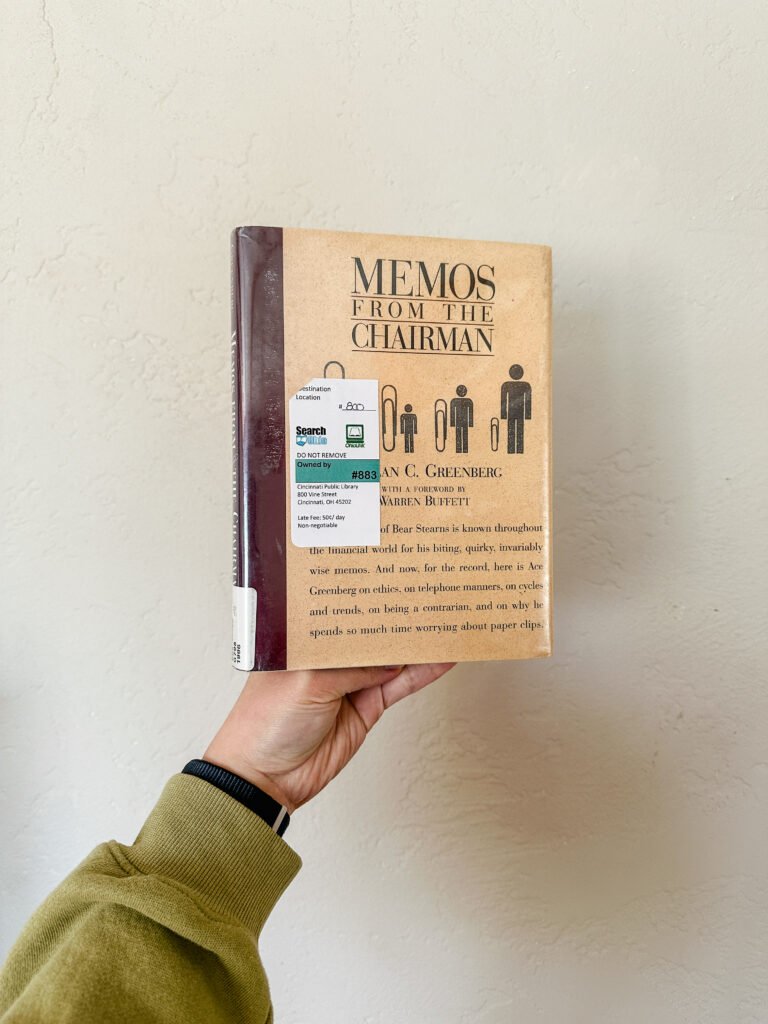6 Key Points from Memos from the Chairman
Today’s post might seem a little odd at first, but you’d be surprised what you can learn about human nature and habits today by reading what others wrote years ago. Alan C. Greenberg served as Bear Stearns’ CEO from 1978 to 1993 before moving to executive chairman, and Memos of a Chairman covers three decades of the American financial industry. I enjoyed the glimpse behind the scenes of a bygone workplace environment, and while Bear Stearns did not weather the Great Recession, it’s interesting to see what their values were so many decades ago.

1. Small and Seemingly Trivial Things Add Up
Greenberg wrote countless memos over the decades, instructing managing directors to be hypervigilant about small excesses such as paper clips, rubber bands, fax machines, and electricity usage. It’s a reminder that the small things that seem so trivial really do have an impact over time – it’s just hard to have that ten-thousand foot view when you’re in it.
2. Consistency Matters
Staying the course when others are making big changes or reacting to industry fluctuations is tough, but consistency matters when you’re playing a long game. Greenberg wrote, “Being consistent may be dull, but it leads to a pleasant environment and to happy campers.” (If that’s the case, how is it that so many of us get pulled into the tides? 🤔)
A secondary message to this: You can’t count on luck. As things flux, you have to focus on the inputs.
3. Control Your Expenses
While Greenberg focused primarily on hard costs such as office supplies and electricity usage, I thought this was such a great takeaway. If you control expenses, “even more so in good times,” you’re better set to weather any storms. It allows you to be strategic instead of reactionary.
Translated to personal development and routines, having some structure and discipline to control excess can be a critical way to build habits for the long-term.
4. Lose the Jargon, Use Common Sense
The business world is rife with jargon, acronyms, and fancy way of saying things that are really just common sense, which Greenberg emphasized more in his later memos as operational efficiencies and process improvement became a more popular phenomenon. But do you need all these trappings of continuous improvement organizational philosophy, if you’ve been focusing on the fundamentals all along?
5. Mindset Matters
“This market gives all of us a chance to demonstrate what we are made of.” Think of how you want to live, and who you state you are. Are you living in accordance with what that person would do? (Also I will put in a plug for these self-improvement books, including a few on this very topic.)
6. Reply to Phone Calls and Stop Using the Operator
This key takeaway might feel a little outdated, but I’m taking it to mean: reply to correspondence, quickly. Close the loop and don’t delay. Reduce needless mid-points that create more work for others. I actually think this one is a fun one to think about because it presents a very clear visual and reminds us that even if the actual mechanisms have changed, the theory or rationale behind it has not.
Have you read Memos from the Chairman? If so, what did you think?
